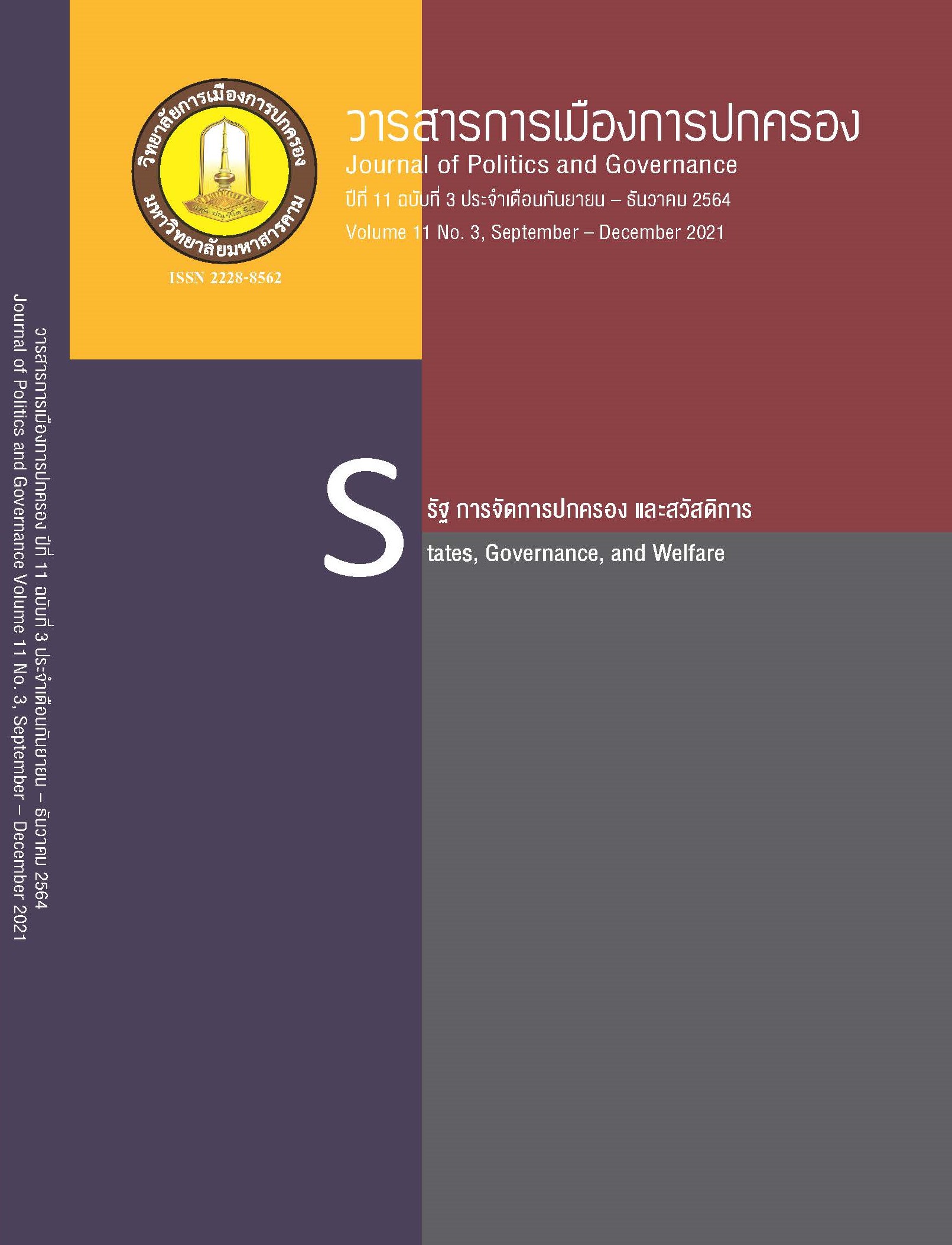The Synthesis of Human Resource Development Process to a Democratic Community
Main Article Content
Abstract
The objectives of this research were to 1) analyze desirable human resource characteristics in a democratic community 2) analyze factors related to human resource development processes in a democratic community and 3) synthesize the human resource development processes to a democratic community by using Qualitative research methodology. The data were conducted by document analysis, in-depth interviews, discussion groups, community surveys, informal interviews, public forum reflecting research process, and suggestions hearings. The research tools were semi-structured interview, observational, and focus groups. The key informants were included qualified experts of 5 persons, community leaders of 11 persons, and a group representing stakeholders of 129 persons of whom selected by purposive sampling in accordance to educational issues. Data were analyzed by content analysis and verified the accuracy by the triangulation technic. The results showed that: 1) Desirable human resource characteristics in a democratic community were categorized three of these: (1) wisdom and knowledge, (2) behavior and adaptation, and (3) human relationship. 2) Factors associated to the development of human resources in the community to promote democratic were included: education, culture, traditions, local budget, modern technology access, learning and adaptation of the community, community leaders, and cooperation of the community. The conditions to supportive development of human resources in the democratic community are entitled to six conditions: (1) development process, (2) support from related sector agencies, (3) skills and knowledge, (4) morality and ethics, (5) time and location and, (6) culture, tradition and community capital. Finally, 3) Development process of human resources in the community including four steps: (1) individuals to understand their rights and responsibilities and strictly observed, (2) families should have an obligation to teach their children to understand the principles of democracy, (3) community or village members should have equality and equal participation in community activities. Communities should complement each other which lead to a strong community, and (4) associating networks must collaborate in the integration to promote and encourage the community to be strengthened by democratic community ways of life.
Article Details
References
เจษฎา นกน้อย. (2554). แนวคิดการบริหารทรัพยากรมนุษย์ร่วมสมัย. กรุงเทพฯ: จุฬาลงกรณ์มหาวิทยาลัย.
ฉัตรทิพย์ นาถสุภา. (2557). การเป็นสมัยใหม่กับแนวคิดชุมชน. กรุงเทพฯ: ด่านสุทธาการพิมพ์.
ทิพย์พาพร ตันติสุนทร. (2558). การศึกษาเพื่อสร้างพลเมือง (พิมพ์ครั้งที่ 4). กรุงเทพฯ: พี เพรส.
บุญชม ศรีสะอาด. (2554). การวิจัยเบื้องต้น (พิมพ์ครั้งที่ 9). กรุงเทพฯ: สุวีริยาสาส์น.
บุญทัน ดอกไธสง. (2552). ประชาธิปไตยรากหญ้า. กรุงเทพฯ: ปัญญาชน.
ปกรณ์ ปรียากร. (2550). การวางแผนกลยุทธ์: แนวคิดและแนวทางเชิงประยุกต์ (พิมพ์ครั้งที่ 9). กรุงเทพฯ: เสมาธรรม.
ผ่องพรรณ ตรัยมงคลกูล และสุภาพ ฉัตราภรณ์. (2555). การออกแบบการวิจัย (พิมพ์ครั้งที่ 7). กรุงเทพฯ: มหาวิทยาลัยเกษตรศาสตร์.
พรอัมรินทร์ พรหมเกิด. (2555). วัฒนธรรมทางการเมืองกับการพัฒนาประชาธิปไตยในเขตชนบทอีสาน: กรณีศึกษาประชาชนในเขตหมู่บ้านคำบงและหมู่บ้านสะอาด ตำบลสะอาด อำเภอน้ำพอง จังหวัดขอนแก่น. คณะมนุษยศาสตร์และสังคมศาสตร์ มหาวิทยาลัยขอนแก่น.
รงค์ บุญสวยขวัญ. (2557). ตัวชี้วัดทางการเมืองภาคพลเมืองในบริบทประชาธิปไตยไทย (พิมพ์ครั้งที่ 2). นครศรีธรรมราช: เสือผินการพิมพ์.
วรากรณ์ สามโกเศศ. (2554, 3 มีนาคม). การศึกษาเพื่อสร้างความเป็นพลเมือง. มติชน, หน้า 6.
วิเชียร อินทะสี. (2556). พลวัตรความเป็นประชาธิปไตยในเกาหลีใต้จากอำนาจนิยมสู่ความเป็นประชาธิปไตยที่มั่นคง. กรุงเทพฯ: จุฬาลงกรณ์มหาวิทยาลัย.
วุฒิสาร ตันไชย. (2555). องค์กรปกครองส่วนท้องถิ่นในทศวรรษหน้า. กรุงเทพฯ: กรมส่งเสริมการปกครองท้องถิ่น.
ศุภชัย คำขำ และวรภูริ มูลสิน. (2559). การพัฒนาประชาธิปไตยโดยใช้การบริหารแบบมีส่วนร่วมและการสร้างความเข้มแข็งให้กับชุมชนขององค์กรปกครองส่วนท้องถิ่น. สืบค้นจาก http://hs.pbru.ac.th/phocadownloadpap/ hs_magazine/2_2559/5.pdf.
สำนักงานเลขาธิการสภาผู้แทนราษฎร. (2555). พลเมืองในระบอบประชาธิปไตย. กรุงเทพฯ: สำนักงานเลขาธิการสภาผู้แทนราษฎร.
สุจิต ญบงการ. (2556). การพัฒนาประชาประชาธิปไตยระหว่างไทยกับประเทศอินโดนีเซีย. กรุงเทพฯ: สำนักงานเลขาธิการสภาผู้แทนราษฎร.
เสกสรรค์ สนวา. (2562). กระบวนการพัฒนาทรัพยากรมนุษย์สู่ความเป็นชุมชนประชาธิปไตย. (ปริญญาปรัชญาดุษฎีบัณฑิต การพัฒนาทรัพยากรมนุษย์และชุมชน). บัณฑิตวิทยาลัย มหาวิทยาลัยเกษตรศาสตร์.
เอนก เหล่าธรรมทัศน์. (2556). การเมืองของพลเมืองสู่สหัสวรรษใหม่ (พิมพ์ครั้งที่ 6). กรุงเทพฯ: คบไฟ.
Delahaye, B.L. (2005). Human Resource Development: Adult Learning and Knowledge Management (2nded). Qld: John Wiley and Sons Austrlia, Ltd.
Diamond, L. (1992). Economic Development and Democracy Reconsidered. American Behavioral Scientist. 35(4/5), 450 – 499.
Heywood, A. (2004). Political theory: An introduction (3rded). New York: Palgrave Macmillan.
Pye, L.W. (1966). Aspect of Political Development. Boston: Little Brown and Company.
Wart, V.M., N. Cayer, and S. Cook. (1993). Handbook of Training and Development for the Public Sector. San Francisco: Jossey-Bas.


